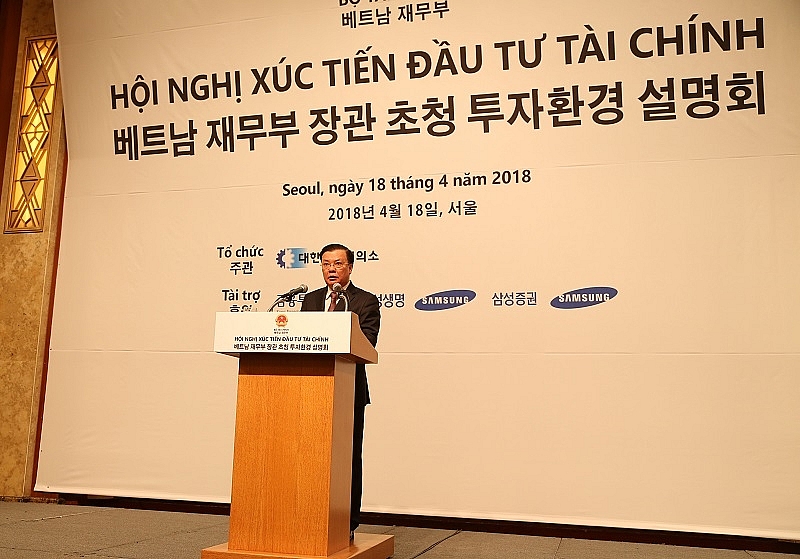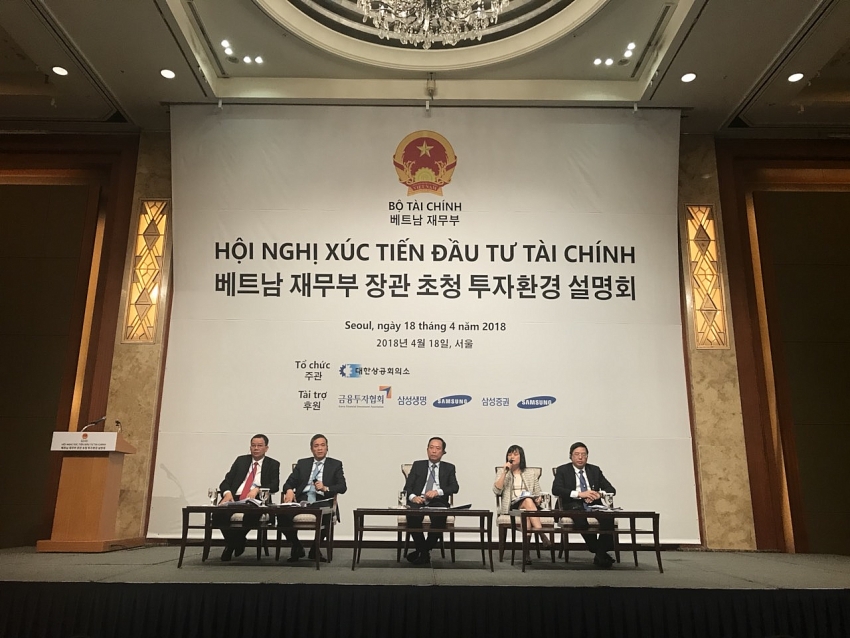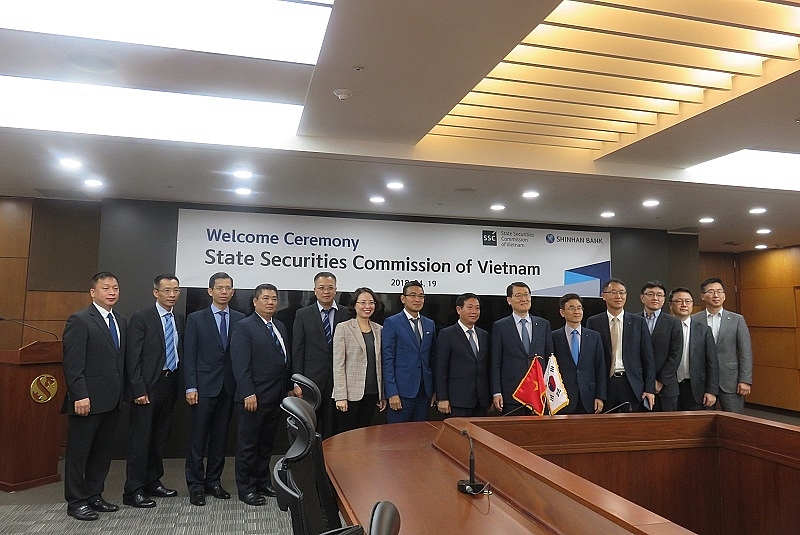Points of interest at Investment Promotion Conference in Seoul
 |
| Points of interest at Investment Promotion Conference in Seoul |
Over 400 South Korean investors and leaders of authorities, including Korea’s Financial Services Commission (FSC), Korea Chamber of Commerce and Industry (KCCI), Korea Financial Investment Association (KOFIA), and Korea Exchange (KRX), as well as investment funds, investment banks and insurance companies participated at Vietnam’s Investment Promotion Conference in Seoul on April 18, hosted by Vietnam’s Minister of Finance.
 |
| The Vietnamese speakers were bombarded by questions from Korean investors |
In his opening remarks, Minister of Finance Dinh Tien Dung highly appreciated the active involvement of Korean investors and partners who have helped build a sturdy rapport between Vietnam and Korea.
Following some 25 years of formal diplomatic relations, the relationship between Vietnam and Korea has grown strong. Vietnam and Korea share many similarities in their cultural traditions, histories, and will for development. This is a very important factor to maintain the bilateral cooperation between the two sides.
Korea is now the second largest trading partner of Vietnam, while Vietnam is Korea’s fourth largest trading partner. By March 2018, there were 126 countries and territories investing in Vietnam, and Korea ranked first on the list. A raft of new-generation free trade agreements have also been signed between the two, including the Vietnam-Korea Free Trade Agreement (VKFTA).
Korean investors raised a multitude of questions during the conference, asking about the differences between the stock markets in Vietnam and others, the prospects of the corporate bond market in Vietnam, opportunities from the IPOs of Vietnamese enterprises, procedures for investment, and how Korean investors could take part in supporting Vietnamese enterprises and find partners in Vietnam.
Regarding the corporate bond market, head of the Finance and Banking Department under the Ministry of Finance (MoF) Phan Thi Thu Hien shared that the ministry is working on solutions for the primary market, focusing on businesses’ requirements of transparency. In the secondary market, local regulators will concentrate on solutions to enhance liquidity.
 |
Vietnam will set up a business information centre, which is to be led by the State Security Commission (SSC). The local government is also preparing to issue a decree on government bonds for foreign investors in particular, as government bonds and corporate bonds in Vietnam are not applied a foreign investment limit.
Regarding Korean technology companies that are looking to find a Vietnamese partner, SSC chairman Tran Van Dung said there are two approaches, with the first to set up a 100 per cent Korean-owned enterprise in Vietnam to provide services or to contribute capital to purchase shares of businesses in the same industry in Vietnam.
Following the conference, dozens of bilateral meetings were held. State Capital Investment Corporation (SCIC) received the most attention, offering investment opportunities in Tien Phong Plastics, Sa Giang Import-Export JSC, Domesco, and FPT.
Nguyen Chi Thanh, deputy general director of SCIC, said that about VND2.6 trillion ($115.55 million) has been invested by Korean investors into SCIC-funded businesses.
In relation to the insurance sector, there are two SCIC-funded joint ventures between Korean partners, namely Vinare and Bao Minh Insurance. SCIC has been in talks with ten Korean investors who were interested in a number of issues, including portfolio divestment, divestment approaches, and investment opportunities between the two nations.
Other enterprises like Vietnam Airlines, Debt and Asset Trading Corporation (DATC), Bao Viet Holdings, Vietnam Post and Telecommunications Corporation (VNPT), An Phat Group, KB Securities, Dragon Capital, and Eastspring Investments have also received great attention from Korean investors.
SSC’s Dung said that Korea has a large business community in Vietnam, including five securities companies that are either 100 per cent or over 90 per cent Korean-owned. “We appreciate the efforts made by the Korean government and are committed to facilitating the two countries’ businesses to reach the goal of $100 billion in trade turnover by 2020.”
What the stars mean:
★ Poor ★ ★ Promising ★★★ Good ★★★★ Very good ★★★★★ Exceptional
Related Contents
Latest News
More News
- Vietnamese businesses diversify amid global trade shifts (February 03, 2026 | 17:18)
- Consumer finance sector posts sharp profit growth (February 03, 2026 | 13:05)
- Vietnam and US to launch sixth trade negotiation round (January 30, 2026 | 15:19)
- NAB Innovation Centre underscores Vietnam’s appeal for tech investment (January 30, 2026 | 11:16)
- Vietnam moves towards market-based fuel management with E10 rollout (January 30, 2026 | 11:10)
- Vietnam startup funding enters a period of capital reset (January 30, 2026 | 11:06)
- Vietnam strengthens public debt management with World Bank and IMF (January 30, 2026 | 11:00)
- PM inspects APEC 2027 project progress in An Giang province (January 29, 2026 | 09:00)
- Vietnam among the world’s top 15 trading nations (January 28, 2026 | 17:12)
- Vietnam accelerates preparations for arbitration centre linked to new financial hub (January 28, 2026 | 17:09)

 Tag:
Tag:



















 Mobile Version
Mobile Version